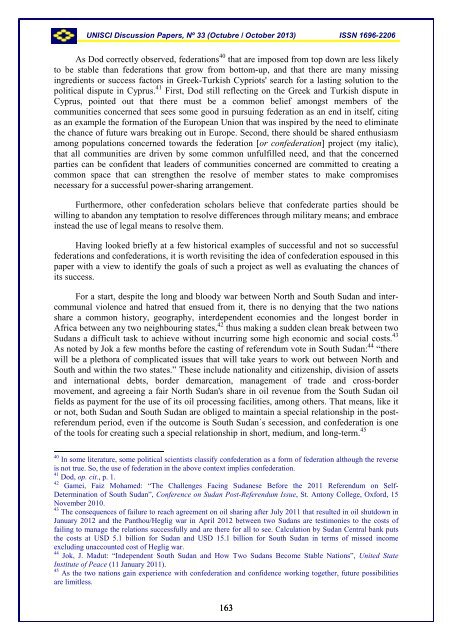UNISCI - Universidad Complutense de Madrid
UNISCI - Universidad Complutense de Madrid
UNISCI - Universidad Complutense de Madrid
Create successful ePaper yourself
Turn your PDF publications into a flip-book with our unique Google optimized e-Paper software.
<strong>UNISCI</strong> Discussion Papers, Nº 33 (Octubre / October 2013) ISSN 1696-2206As Dod correctly observed, fe<strong>de</strong>rations 40 that are imposed from top down are less likelyto be stable than fe<strong>de</strong>rations that grow from bottom-up, and that there are many missingingredients or success factors in Greek-Turkish Cypriots' search for a lasting solution to thepolitical dispute in Cyprus. 41 First, Dod still reflecting on the Greek and Turkish dispute inCyprus, pointed out that there must be a common belief amongst members of thecommunities concerned that sees some good in pursuing fe<strong>de</strong>ration as an end in itself, citingas an example the formation of the European Union that was inspired by the need to eliminatethe chance of future wars breaking out in Europe. Second, there should be shared enthusiasmamong populations concerned towards the fe<strong>de</strong>ration [or confe<strong>de</strong>ration] project (my italic),that all communities are driven by some common unfulfilled need, and that the concernedparties can be confi<strong>de</strong>nt that lea<strong>de</strong>rs of communities concerned are committed to creating acommon space that can strengthen the resolve of member states to make compromisesnecessary for a successful power-sharing arrangement.Furthermore, other confe<strong>de</strong>ration scholars believe that confe<strong>de</strong>rate parties should bewilling to abandon any temptation to resolve differences through military means; and embraceinstead the use of legal means to resolve them.Having looked briefly at a few historical examples of successful and not so successfulfe<strong>de</strong>rations and confe<strong>de</strong>rations, it is worth revisiting the i<strong>de</strong>a of confe<strong>de</strong>ration espoused in thispaper with a view to i<strong>de</strong>ntify the goals of such a project as well as evaluating the chances ofits success.For a start, <strong>de</strong>spite the long and bloody war between North and South Sudan and intercommunalviolence and hatred that ensued from it, there is no <strong>de</strong>nying that the two nationsshare a common history, geography, inter<strong>de</strong>pen<strong>de</strong>nt economies and the longest bor<strong>de</strong>r inAfrica between any two neighbouring states, 42 thus making a sud<strong>de</strong>n clean break between twoSudans a difficult task to achieve without incurring some high economic and social costs. 43As noted by Jok a few months before the casting of referendum vote in South Sudan: 44 “therewill be a plethora of complicated issues that will take years to work out between North andSouth and within the two states.” These inclu<strong>de</strong> nationality and citizenship, division of assetsand international <strong>de</strong>bts, bor<strong>de</strong>r <strong>de</strong>marcation, management of tra<strong>de</strong> and cross‐bor<strong>de</strong>rmovement, and agreeing a fair North Sudan's share in oil revenue from the South Sudan oilfields as payment for the use of its oil processing facilities, among others. That means, like itor not, both Sudan and South Sudan are obliged to maintain a special relationship in the postreferendumperiod, even if the outcome is South Sudan´s secession, and confe<strong>de</strong>ration is oneof the tools for creating such a special relationship in short, medium, and long-term. 4540 In some literature, some political scientists classify confe<strong>de</strong>ration as a form of fe<strong>de</strong>ration although the reverseis not true. So, the use of fe<strong>de</strong>ration in the above context implies confe<strong>de</strong>ration.41 Dod, op. cit., p. 1.42Gamei, Faiz Mohamed: “The Challenges Facing Sudanese Before the 2011 Referendum on Self-Determination of South Sudan”, Conference on Sudan Post-Referendum Issue, St. Antony College, Oxford, 15November 2010.43 The consequences of failure to reach agreement on oil sharing after July 2011 that resulted in oil shutdown inJanuary 2012 and the Panthou/Heglig war in April 2012 between two Sudans are testimonies to the costs offailing to manage the relations successfully and are there for all to see. Calculation by Sudan Central bank putsthe costs at USD 5.1 billion for Sudan and USD 15.1 billion for South Sudan in terms of missed incomeexcluding unaccounted cost of Heglig war.44 Jok, J. Madut: “In<strong>de</strong>pen<strong>de</strong>nt South Sudan and How Two Sudans Become Stable Nations”, United StateInstitute of Peace (11 January 2011).45 As the two nations gain experience with confe<strong>de</strong>ration and confi<strong>de</strong>nce working together, future possibilitiesare limitless.163
















